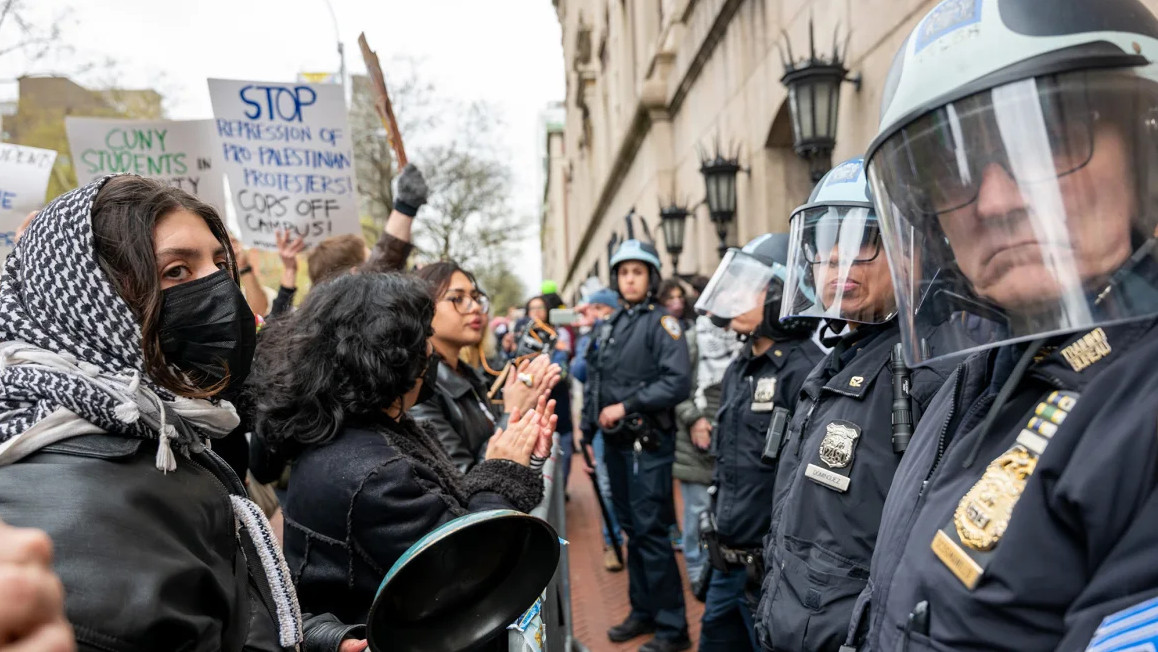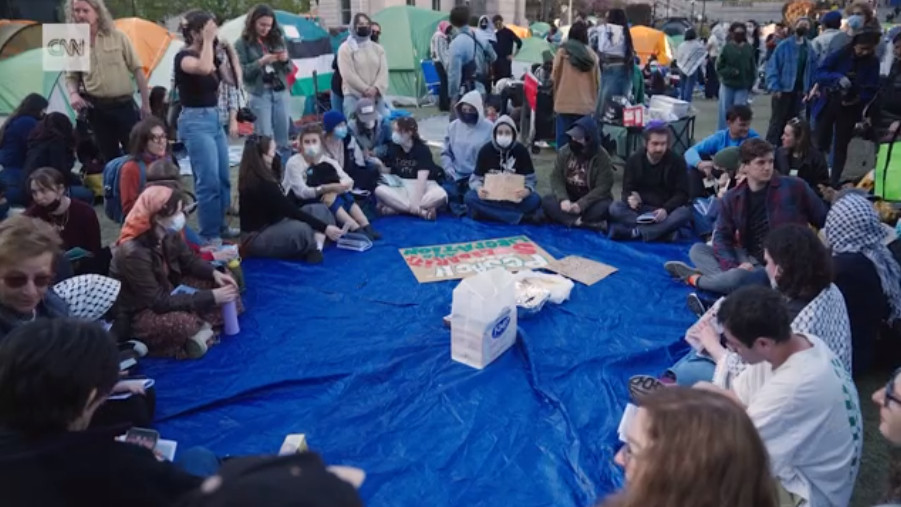
Date: 2024-12-21 Page is: DBtxt003.php txt00026754
US COLLEGE PROTESTS
Written by Rev. Dr. Serene Jones. President at Union Theological Seminary
What I learned watching suspended students share with my community
Written by Rev. Dr. Serene Jones. President at Union Theological Seminary
What I learned watching suspended students share with my community

Students and pro-Palestinian activists face police as they gather outside of Columbia
University to protest the university's stance on Israel on April 18, 2024 in New York City.
Spencer Platt/Getty Images
Original article: https://www.cnn.com/2024/04/26/opinions/columbia-university-protests-union-theological-jones/index.html
Peter Burgess COMMENTARY
Peter Burgess
Opinion written by Serene Jones
Editor’s Note: Rev. Dr. Serene Jones is president at Union Theological Seminary, a globally recognized seminary and graduate school of theology where faith, spirituality and scholarship meet to reimagine the work of justice. The views expressed here are her own. Read more opinion on CNN.
Updated 12:27 PM EDT, Fri April 26, 2024
Last Thursday, I listened in horror as sirens blared outside my office window at Union Theological Seminary. Hundreds of officers from the New York City Police Department flooded onto the campus of our neighbor, Columbia University, to forcibly remove more than 100 peaceful student protestors from an encampment. Students were gathered there calling for action in the ongoing war in Gaza, including demanding the university sever any ties with Israel.
As the president of an institution with a 187-year legacy of leading on issues of justice and peace – where protesting is in our DNA – these events have shaken me to my core. I felt compelled to reach out to the community not just due to deeply held moral convictions, but due to strong principles of faith and spirituality.
In a community letter, I let our students, faculty and staff know that Union is an institution committed to being a safe haven for all – but especially our most vulnerable communities. And as an institution committed to academic freedom for deeply moral and spiritual reasons, we never silence voices of protest. We value these voices, even at times when that protest is against us.
Most importantly, I reminded our students that the aggressive police action being taken on other campuses across the country will not be taken here. As their president, I have their back.
In writing to our community, I had no intention of being radical or self-righteous. I was simply reminding the community of who we are – not only on days like last Thursday, but every day.

Inside the Seder dinner on Columbia’s Gaza protest encampment
As the president of a higher education graduate school, the actions of my sister institutions tore me apart. Some of our students were also arrested while protesting. Instead of suspending or expelling them, we offered them care – as is our practice every day. We don’t do everything perfectly, but we are committed to trying our best to engage in the messy work of justice and peace.
In the days that followed, we received several requests from the Columbia community. Faculty asked if they could teach suspended students (who were no longer allowed on their campus) at Union. Suspended Jewish students also asked if they could host a Passover seder on our campus on Monday evening this week.
Our response to all these requests was a resounding “yes.”
Union’s small but mighty staff put tremendous effort into working out all the logistics so we could make this happen, and our wonderful students worked hard to set up our courtyard on Monday evening for a meaningful Passover seder. The service – led by Columbia’s Jewish students – restored for those of us present our sense of community. It was wonderful to see Union’s diverse community of Christian, Jewish, Muslim, Buddhist and spiritual but not religious students congregate and share a meal with Columbia’s Jewish students. Together, they held a seder like those happening all over the world. There was prayer. There was quiet contemplation. There was laughter.
I, like so much of the rest of the world in this moment, yearn for more Mondays instead of Thursdays.
These experiences illuminate the core of the tragedy gripping so many corners of our country. The war has caused immense pain and turmoil among myriad groups for a host of different reasons. People are mourning the victims of Hamas’ attacks on Israel. People are agonizing over the death of tens of thousands of people in Gaza. People are grieving the loss of friends and family members overseas. People are grappling with antisemitism and Islamophobia.
But amidst all of that, people are just looking for a common humanity – a way to stop the pain and make a difference. A way to find solace, together.
Unfortunately, rather than seeking to understand one another’s perspectives and show empathy, many have claimed the moral high ground and attempted to quash any contrary opinions. University campuses have become battlegrounds.
Since the horrifying events of October 7 in Israel, our world has seemingly descended into chaos. As a faith leader, I, along with my Jewish siblings, am grieving all the lives lost that day to violence and those who have terrifyingly been taken hostage. Along with my Muslim siblings, I am also mourning the more than 32,000 Palestinian lives lost, according to health officials in Gaza, to this crushing war and an unfolding humanitarian crisis of epic proportions.
I am deeply grieved that as a nation, our American community has become so divided by this war. It is ripping communities, campuses and even families apart.
We at Union struggle with it as well. Our community has diverse perspectives on the war. As an institution committed to the hard and messy work of advancing justice and peace, we have engaged in difficult community conversations led by our faculty. Our goal has not been to build consensus, but rather to create safe community spaces where we can center our shared values.
We are far from perfect. We’re a historically Christian seminary – and Christians have been and continue to be the source of some of the most virulent forms of hatred and violence. We stand against this, with humility.
Whatever our differences, I firmly believe campuses must be places for lively, rigorous debate, where we struggle collectively to find better ways to live together on this planet, and where students have the chance to find and strengthen their voices. Education is to experience the power of collective action, to become a passionate, engaged citizen. These precious values do not flourish when protests are squashed. Democracy itself cannot flourish.
With the events that unfolded at Columbia last Thursday, we are seeing encampments of peaceful student protestors rise up on campuses across the country. While university leaders are under tremendous pressure to respond with full force, I hope this tide of intolerance can be turned towards our highest values – including a commitment to freedom of speech. Campuses should be spaces where we learn to build a better world, not a more destructive one.
In these precarious times, it is all the more important that these values be upheld. Please join us in the struggle to manifest these values. That, at its core, is what it means to be true educators.
RELATED ARTICLES
Harvard University President Claudine Gay delivers an opening statement as she attends a House hearing on Capitol Hill in Washington, DC, on December 5.
Opinion: My students aren’t debating ‘genocide,’ they’re looking for the freedom to learn